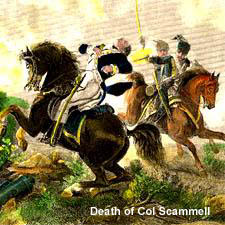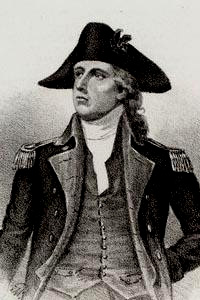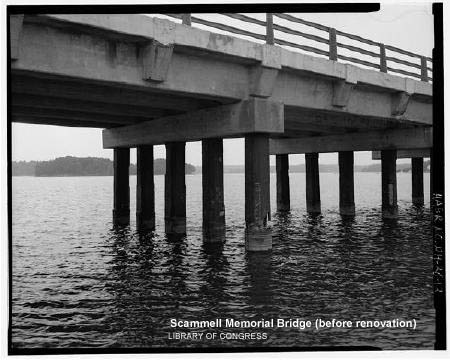|
FRESH STUFF DAILY |
|
|
||
|
|
||
|
|
||
|
SEE ALL SIGNED BOOKS by J. Dennis Robinson click here |
||
A NH lawyer born in Massachusetts, Scammell died at the Battle of Yorktown towards the end of the Revolution. His distinguished military career began at the Seige of William and Mary in 1774 and brought him to Quebec, Trenton, Saratoga, Princeton, Monmouth and Valley Forge.
MORE NH Framers In April, 1779, the main army of the American forces was enjoying a lull in the fightin. Soldiers could now take a moment to think of matters other than survival on the battlefield. "I fear," wrote Adjutant-General Alexander Scammell in a letter to Col. Nathaniel Peabody, one of New Hampshire’s representatives to the Continental Congress, "that the war will doom me to old bachelorism—however, content myself with this consideration, that there is enough of the breed already, though this consideration don’t (sic) fully correspond with my feelings on the opening of Spring."
Scammell also had a sincere concern for his men. When Congress seemed to be abandoning its duty in providing the necessitites of food and clothing for the troops, Scammell sent searing letters to Congress condemning it for reducing the fighting men to "slavery" and "beggary." He blamed the large number of desertions not on the men but on the hunger that drove them to it. Alexander Scammell was born in 1744 in Milford Mass. After his graduation from Harvard in 1769, he taught school in Massachusetts and Maine and worked as an explorer and surveyor of the territory in southern Maine. In 1774, Scammell went to Durham to study law under John Sullivan. But Scammell found it difficult to concentrate on law books. Instead, he spent much of his time studying wars of the past. Durham was buzzing with rumors that British troops were being sent to occupy Portsmouth, and Scammell was able to participate in the growing struggle sooner than he expected. CONTINUE Col. Alexander Scammell
On December 15, 1774, John Sullivan organized the second raid on Fort William and Mary at new Castle. Scammell was a member of the raiding party, and it was he who pulled down the British flag flying over the fort. After the capture of Fort William and Mary, Sullivan returned to his duties with the Continental Congress in Philadelphia and sent Scammell back to Durham to ten to his law office. But Scammell had had a taste of action and could not be confined to a desk and chair. He joined the New Hampshire ranks at the Battle of Bunker Hill, and when Sullivan’s troops were ordered to new York in the summer of 1776, Scammell went with them. George Washington quickly recognized the young man’s abilities and awarded him two commissions in four months, finally promoting him to the position of adjutant-general, or chief administrative officer, of Gen. Lee’s division.
Scammell served as a special aide to Washington and rode in his board to the Christmas night crossing of the Delawre that preceded the Battle of Trenton. A week later, when the American forces were being badly beaten at Priceton, Scammell decided to rally his men for one last push and to lead the charge himself. Washington happened to ride up at that moment and seeing the situation, joined Scammell in the front line as a means of inspiring the men. It was a brazen, foolhardy move by both officers, but luckily, neither was hurt. The charge turned the battle into a victory for the Americans and gave Scammell a stature almost equal to Washington’s in the eyes of the fighting men. Alexander Scammell returned only once to New Hampshire—in May 1777, to raise a regiment to oppose Burgoyne at Ticonderoga. He had by then been promoted to the rank of colonel. Scammell was wounded in one of the first encounters with Burgoyne’s forces, but he refused to give up his command until the British surrendered at Saratoga. In 1778, Scammell was promoted to adjutant-general of the Continental Army. The British were at this time evacuating from Philadelphia, and Washington ordered Gen. Lee to pursue. When Lee refused, Scammell and Washington took over command of the troops and led them into the battle at Monmouth. It wasn’t the best showing the Continental forces had made, but the British did retreat during the night. At the conclusion of the battle, Washington said, "the man who inspired us to do out full duty was Alexander Scammell." Scammel’s response was that Washington never had had so great a chance as at Monmouth to score a decisive victory, had Lee obeyed orders. That night Washington commanded Scammell to arrest his old general. Finally, in 1781, the Americans knew they were winning. Washington placed Scammell in charge of the light infantry for the siege on Yorktown and allowed him to pick his own subordinate officers. During the siege Scammell was wounded, and six days later he died. Scammell’s fear had come true; the war had doomed him to "bachelorism." Both Col. John Brooks, later governor of Massachusetts, and Col. Henry Dearborn, who later became secretary of war, named their sons after Alexander Scammell. Lafayette, on his last visit to this country in 1824-25, proposed a toast at a gathering of Revolutionary War veterans "to the memory of Yorktown Scammell." By Gail Kelley. Originally published in "NH: Years of Revolution," Profiles Publications and the NH Bicentennial Commission, 1976. Reprinted by permission of the publisher. First posted online at SeacoastNH.com in 1997. Revised in 2006. IMAGES -- TOP: 1859 engraving entitled "Death of Col. Scammell at the Siege of Yorktown" and 19th century engraving of Scammell. BOTTOM: Colonel Alexander Scammell Memorial Bridge, Spanning Bellamy River at U.S. Route 4, Dover, Strafford County, NH. From American Memory at Library of Congress. Please visit these SeacoastNH.com ad partners.
News about Portsmouth from Fosters.com |
| Friday, April 19, 2024 |


|
Copyright ® 1996-2020 SeacoastNH.com. All rights reserved. Privacy Statement
Site maintained by ad-cetera graphics

 Link Free or Die
Link Free or Die




 The 35-year old commander of the First New Hampshire Battalion was one fo the youngest, most dashing officers in Washington’s army, and his temperament matched his good looks. He had a likable sense of humor and moved with ease in social gatherings. It is said he could approach George Washington with a familiarity no other officer could get away with.
The 35-year old commander of the First New Hampshire Battalion was one fo the youngest, most dashing officers in Washington’s army, and his temperament matched his good looks. He had a likable sense of humor and moved with ease in social gatherings. It is said he could approach George Washington with a familiarity no other officer could get away with.















